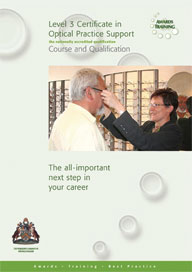The Worshipful Company of Spectacle Makers spent two years devising its latest course and qualification for senior optical assistants. It believes the result is a vital opportunity for those who want to further develop their career
The Level 3 course and qualification in Optical Practice Support (OPS) was developed by a small team within the SMC. They examined how it could build on the success of the Level 2 OPS course and certificate and the Level 2 National Occupational Standards. A draft syllabus was drawn up and then reviewed by the Awards Committee and the Training Committee of the SMC, senior figures within optics and finally the WCSM Court.
Once the syllabus was agreed, the qualification was submitted to the regulatory authorities (QCA in England, DELLS in Wales and CEA in Northern Ireland) for approval.  Following accreditation, examiners were appointed to finalise the examination style and content, the distance-learning course material written in easy-to-manage sections, and tutors appointed. The result of all this work is the only nationally-approved qualification at Level 3 for optical assistants.
Following accreditation, examiners were appointed to finalise the examination style and content, the distance-learning course material written in easy-to-manage sections, and tutors appointed. The result of all this work is the only nationally-approved qualification at Level 3 for optical assistants.
Gordon Jones, the SMC’s Awards Committee chairman, said: ‘We needed to provide that extra step for people’s careers. It was a need that had been clearly identified and it was a need the SMC wanted to meet.
‘Taking the course will show a person’s commitment to their career development. And, if they choose to take the examination and attain the Level 3 Certificate in Optical Practice Support, then it is a clear indication that they have achieved a higher level of knowledge and expertise.
‘Achieving Level 3 is a clear demonstration of what extra skills can be offered to a practice, to employers and, of course, to patients.
‘But as well as being a chance for people to build on their existing abilities, it is also another step forward for those wanting to become a dispensing optician or an optometrist.’
The new course also has the backing of the Association of Optometrists, ABDO and FODO.
Sir Anthony Garrett, general secretary of ABDO, said: ‘ABDO warmly welcomes this initiative by the SMC. Clearly anything that can be done to improve the quality of education and service throughout the sector is to be applauded.
‘The SMC has a long and enviable record of support and education in the optical sector. I am sure that standards will benefit from this latest initiative.’
The SMC believes that the Level 3 syllabus covers most aspects of work associated with the roles of both senior optical assistant and practice supervisor. People can choose to take only the distance-learning course if they do not want to sit the exam. Alternatively, they may do both the course and examination to attain the certificate or go straight in and just sit the examination, if they feel they are already sufficiently experienced and prepared.
The courses start in September 2006 and February 2007, with the examination day held the following June and December. Once someone has enrolled they are allocated a tutor, who will send out course materials that can be worked through at the student’s own pace.
Register now to continue reading
Thank you for visiting Optician Online. Register now to access up to 10 news and opinion articles a month.
Register
Already have an account? Sign in here
